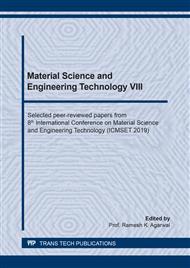p.283
p.293
p.299
p.305
p.311
p.317
p.323
p.329
p.335
Influence of Sodium Hydroxide Grade on the Strength of Fly Ash-Based Geopolymer Cement
Abstract:
Portland cement (OPC) is one of the primary contributors accounted for climate change as a massive amount of Carbon dioxide is emitted to the atmosphere during its production processes. Geopolymer cement (GP), a green construction material, is therefore promoted to be an alternative cementitious binder to replace the consumption of that OPC. GP can be synthesized by mixing pozzolanic wastes (e.g., fly ash or slag) with alkaline solutions (e.g., NaOH and Na2SiO3). The mechanical properties of the geopolymer have been confirmed to be similar to or even better than OPC in the same testing conditions. However, the researches on GP have been mostly carrying out in just a laboratory scale, thus, the Laboratory grade of alkaline activators was commonly used. To make GP more realistic in practical works, the Industrial grade of alkaline activators was hence introduced. The results show that the usage of Industrial grade activators not only provides excellent mechanical properties to GP but also reduces its unit price to less than 20 percent of the conventional GP (GP with Laboratory-grade activator). By this approach, the confidence of expanding this green construction material, from Laboratory scale to In-field applications, is considerably increased.
Info:
Periodical:
Pages:
317-322
DOI:
Citation:
Online since:
June 2020
Price:
Сopyright:
© 2020 Trans Tech Publications Ltd. All Rights Reserved
Share:
Citation:


